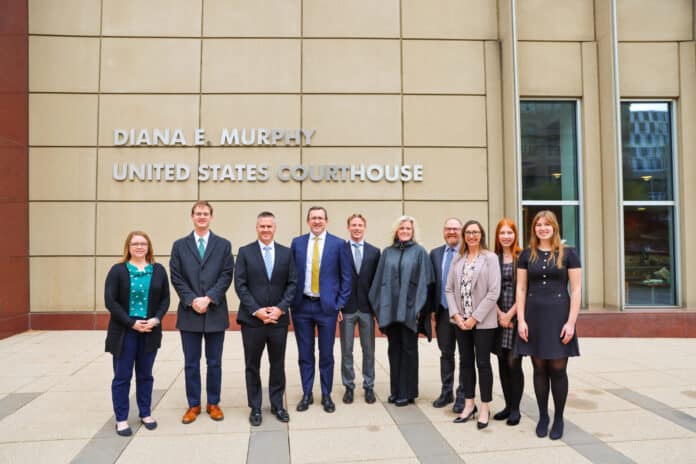
A group of parents suing Gov. Tim Walz over a new law that would prohibit certain private colleges from participating in the Post Secondary Enrollment Options (PSEO) program appeared in federal court last week.
Melinda and Mark Loe and Dawn Erickson are co-plaintiffs in the petition they filed last year against Walz and his Minnesota Department of Education commissioner, Willie Jett, which alleges that a new law the Democratic governor signed to prohibit colleges that have a statement of faith requirement for students from participating in PSEO programs is unconstitutional.
Crown College, in St. Bonifacius, and University of Northwestern, in St. Paul, are also named as co-plaintiffs.
“Minnesota wants to single out our university because of this unique campus culture which integrates faith and learning,” said Corbin Hoornbeek, president of Northwestern, in a statement about the lawsuit last week. “We pray the court will recognize that and continue to allow us to help on-campus PSEO students flourish in their faith and education.”
The Loes have children who are eligible to participate in the state’s PSEO program and live just a few miles east of the Crown College campus in the west metro. Erickson has a child eligible for PSEO and lives just a few minutes from the University of Northwestern.
The families and representatives for the two Christian colleges appeared at a hearing last Monday in federal district court in Minneapolis. They are being represented by the Beckett Fund for Religious Liberty, a Washington, D.C.-based non-profit, public-interest legal organization.
The federal district judge assigned to the case is Nancy Brasel.
The new law was tucked inside a 300-page education omnibus bill that passed along party lines in May 2023, and then was signed by Walz.
Republican legislators had argued that the change was unconstitutional and would create a shortage of available PSEO programs. They were able to remove the provision via an amendment, but the controversial item was reinserted into the bill by a conference committee controlled by DFL legislators. That bill was then passed by Democrats and signed by Gov. Walz.
It prohibits religious colleges from requiring on-campus PSEO students to sign a faith statement attesting to the institution’s beliefs and values. The new law also forbids schools from basing “any part of the admission decision on a student’s race, creed, ethnicity, disability, gender, or sexual orientation or religious beliefs or affiliations.”
Just weeks after the lawsuit was filed last year, the court issued a preliminary injunction prohibiting the state from enacting the law while the case is under litigation.
“In the last six years, the Supreme Court has three times held that once a state opens funding to private institutions, the First Amendment’s Free Exercise Clause forbids excluding participants based on their religion or their religious use of the funds,” the lawsuit states.
Wisconsin-based secular non-profit Freedom From Religion Foundation filed an amicus brief that sides with the state in the case and argues the state may set nondiscrimination conditions on education programs that it funds.
Attorneys for the plaintiffs argue that Walz and partisan politicians at the legislature are “slamming the door on thousands of high schoolers who want to get a head start on college simply because they’re religious.”
“That’s disgraceful,” said Eric Baxter, vice president and senior counsel at Becket. “The state should be helping educate its students, not cutting them off from opportunities that will allow them to grow. We’re confident the court will strike down Minnesota’s ban for good.”
Hank Long
Hank Long is a journalism and communications professional whose writing career includes coverage of the Minnesota legislature, city and county governments and the commercial real estate industry. Hank received his undergraduate degree at the University of Minnesota, where he studied journalism, and his law degree at the University of St. Thomas. The Minnesota native lives in the Twin Cities with his wife and four children. His dream is to be around when the Vikings win the Super Bowl.
















